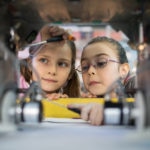Women and girls in science: we still have a long way to go
Only 7% of girls see themselves as scientists in the future. This is due to the gender gap that remains in science, technology, engineering and mathematics (STEM) sectors, even though more than a century has passed since Marie Curie won the Nobel Prize in Chemistry. That’s why the International Day of Women and Girls in Science continues to be so important.

Although the number of women getting advanced degrees has increased exponentially in recent years, they are still under-represented in science-related fields. In fact, science and gender equality are crucial to attaining the Sustainable Development Goals (SDGs) the United Nations (UN) has included in its 2030 Agenda.
“According to a study conducted in 14 countries, the probability for female students of graduating with a Bachelor’s degree, Master’s degree and Doctor’s degree in science-related field are 18%, 8% and 2% respectively, while the percentages of male students are 37%, 18% and 6%,” the UN reports. In order to promote the critical role women play in these fields, in 2015, the UN General Assembly declared February 11th the International Day of Women and Girls in Science.
The goal of this celebration is to encourage girls to pursue studies in science, technology, engineering and mathematics, without worrying about gender issues. According to a study published in Science magazine in January 2017, it’s around the age of 6 or 7 when girls start to associate sciences exclusively with males. Stereotypes are ingrained in girls from a young age that make them think that males are the ones with the the qualities needed to tackle these subjects.
That’s why initiatives like “11 de febrero” (February 11th) in Spain are so necessary. More than 900 people from the scientific community - primarily female researchers - will offer talks and workshops. The celebration is more than justified, as data provided by the organization reveals that just 7% of girls see themselves as scientists in the future - an astonishingly low figure.
Despite the difficulties, there are currently women who are making major contributions to the world of science in many different disciplines, such as ecology, medicine and technology. BBVA is also doing its part to fight for gender equality - not just in its hiring practices, but also through the BBVA Foundation, and by recognizing the work of illustrious women like those below:
Gretchen Daily and Georgina Mace
These two scientists focused their research on conservation of global biodiversity. Even though they never worked together, both the women and their studies reach the conclusion that we must act to stop the destruction of nature that is taking place before it’s too late. They were presented the BBVA Foundation Frontiers of Knowledge Award in the Ecology and Conservation Biology category for their scientific contributions.
Georgina Mace is a British scientist who managed to stand out by improving the efficiency of the Red List, an inventory of threatened species. Thanks to her efforts, she identified certain parameters that indicate when a risk of extinction is relatively high for a species.
Meanwhile, Gretchen Daily helped to create the foundation for InVEST (Integrated Valuation of Ecosystem Services and Tradeoffs) software, which quantifies the value of the services an ecosystem provides society. This tool is currently used by organizations in 185 countries.
Pilar Martínez Fernández
Pilar Martínez is Group Leader at the Spanish National Cardiovascular Research (CNIC) and holds a PhD in Immunology. This researcher has dedicated her career to understanding the role the immune system plays in different pathologies, such as cancer, asthma, arthritis, and different cardiovascular diseases.
As a result of her research, she obtained two patents in medicine: “Methods to diagnose heart disease” and “Kit to diagnose acute myocarditis”. Thanks to her contributions, this immunologist was selected as one of the beneficiaries of the BBVA Foundation’s Leonardo Grants.
Ana Laguna
Ana is a data scientist at BBVA Data & Analytics, but it was a personal project that put her in the newspapers. This data scientist is developing an algorithm that listens to a baby crying and helps to identify what the baby needs.
She is currently collecting audio recordings of newborns to expand her sample and build an algorithm that its capable of classifying cries beyond simply “hunger” or “not hunger” and also needs associated with pain, sleep or affection.
Gema Parreño
This technology enthusiast made her first video game at just 12 year old. After getting her degree in architecture, she created her own animation and video game company. That’s when she discovered her passion for programming, and after taking several classes, decided to participate in NASA’s Space App Challenge in 2016. She was selected as one of the winners thanks to her algorithm to detect asteroids.
This data scientist currently works at BBVA Innovation Labs where she uses her knowledge of big data and machine learning to fight fraud.